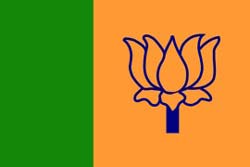The Hindu revivalist movement perceives itself as the cultural chapter of India's decolonization. It tries to free the Indians from the colonial condition at the mental and cultural level, to complete the process of political and economic decolonization. The need for "reviving" Hinduism springs from the fact that the said hostile ideologies (mostly Islam) have managed to eliminate Hinduism physically in certain geographical parts and social segments of India, and also (mostly the Western ideologies) to neutralize the Hindu spirit among many nominal Hindus.
Hindu Fundamentalism
It should already be clear that the movement under consideration cannot be called "Hindu fundamentalism." The reason is not that, as Hindu revivalists commonly argue, "a Hindu cannot be a fundamentalist because the concept of fundamentalism is specific to the Biblical-Koranic tradition." The role of "scripture" is, indeed, not exactly the same in Hinduism as in the "religions of the Book," among other reasons, because there is a plurality of Hindu scriptures. Rather, the key point is that that segment of Hindu opinion that we are considering in the present study does not belong to this scripturalist tendency, even though it may embellish its manifestoes with an occasional (and often creatively reinterpreted) Vedic quotation. Most certainly, it is "not fundamentalist in the sense of being scripturalist."
Fundamentalist movements invariably oppose the lukewarm and compromising tendencies within their own religion; such is not the case at all in Hindu revivalism, which focuses on confronting non-Hindu doctrines or social forces and uniting all Hindus. Fundamentalism, in the true sense of the word, is not in evidence in the Hindu revivalist movement.
Communalism
One of the most frequently used terms in India-watching is communalism, a term unknown to most Westerners. Its roots lie in the British colonial policy of taking "communities" as the relevant units in recruitment or in the allotment of seats in representative assemblies. Originally, the term had no pejorative connotation.
Today, communalism is one of those labels allotted exclusively to people who reject it; it is a term of abuse. This distortion of an otherwise well-defined and useful term started in the 1920s, when Congress leaders took to using it for (i.e., against) Hindu organizations, even though the latter opposed communal electorates and recruitment quota that the Congress had endorsed. Even when Congress became a party to the Partition of India on a communal basis (Pakistan for Muslims, India for non-Muslims), which these Hindu organizations kept on opposing, Congress kept on denouncing the latter as "Hindu communalists."
To justify this shift in meaning, a symmetry was assumed between minority organizations that favored the communal principle and Hindu organizations that opposed it, in the sense that both defended the perceived interests of their own community. The definition of the term was changed. The effective meaning of communalism in post-Partition India is explicated by the Marxist historian Bipan Chandra as "the belief that because a group of people follow a particular religion they have, as a result, common social, political and economic interests." This definition is generally accepted and used, e.g., by Saral Jhingran: "By communalism is meant the assertion that the secular interests of a group of persons are coextensive with its religious identity."
This definition, is, unfortunately, quite wrong. It does not satisfy the defining criterion of a definition, viz. that its semantic domain be coterminous with the phenomenon it seeks to define. When Bipan Chandra and Saral Jhingran talk about "communalism," they certainly include issues like the agitation against cow-slaughter, the Hindu and Muslim agitations concerning the temple or mosque in Ayodhya, and the Satanic Verses affair. These examples involve not "common economic, political, social and cultural interests," but purely religious concerns -- that the birthplace of Rama or the fair name of the Prophet is being violated. Such controversies are not covered by Bipan Chandra's definition of "communalism."
The fact that nowadays the label "communalist" is systematically applied to people who never describe themselves as such, and most of whom go out of their way to deny that they are "communalists," should caution scholars to handle it with utmost care. It may be legitimate to sit down and collect evidence for the thesis that "the Hindu nationalists are communalists," but it is not legitimate, at least not from the viewpoint of scholarly or journalistic duty, to routinely replace their chosen self-description with the externally imposed label "communalist."
 Hindu Nationalism
Hindu Nationalism




